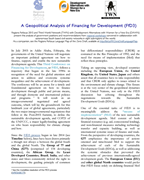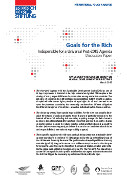Social Watch News
|
Published on Fri, 2015-03-20 12:20
» |
Published on Fri, 2015-03-20 10:45
On Monday, the 23rd of March 2015, government representatives will meet at UN Headquarters for five days of negotiations on the SDG’s goals, targets and indicators. Governments should resist the temptation –particularly when looking at targets and indicators- to be restricted by existing quantitative monitoring systems and the current (and limited) availability of data. Instead, Governments should set a truly transformative and ambitious framework, which will lay the ground for innovative monitoring systems, which include qualitative assessments for key SDG targets such as “policy space” and “justice for all”. Voices of citizens need to be heard to capture the dark corners of inequalities within and among countries and to channel the potential of a 'data revolution' without infringing on privacy or sovereignty. |
Published on Thu, 2015-03-19 18:39
On the 18th March, the Public Services International Research Unit (PSIRU) hosted a side event in New York to promote the report “Why Public-Private-Partnerships don’t work”. The report assessed the impact of Public-Private Partnerships (PPPs) actually undertaken in rich and poor countries. These global case studies show that there is no evidence that PPPs are cheaper or more convenient for governments in the long-term. |
Published on Thu, 2015-03-19 18:27
An intergovernmental accountability mechanism for UN partnerships with the private sector is urgently needed. Regulation and safeguards must replace laxity and low taxes, so that the prevailing paradigm benefits developing countries rather than the corporations that invest in them. Regions Refocus 2015, Third World Network (TWN) and DAWN present their joint recommendations for Addis Ababa. |
Published on Thu, 2015-03-19 18:27
Social Watch will organize -together with different partners- a number of meetings during the World Social Forum 2015 to be held from March 24 -28 in Tunisia. These meetings will be an opportunity to review and reconsider new challenges of the Post 2015 framework and the Financing for Development process and the challenges the Arab countries are going through after the Arab Spring. |
Published on Thu, 2015-03-19 16:39
Spurred by the accelerated pace of globalization, and the rise and dominance of multinational and state-owned enterprises over the last few decades, scholars around the world researched many key industrial sectors and exposed the human rights consequences of our multi-faceted economic life. Today, we know the human rights consequences of resource extraction, as well as production, distribution, consumption and disposal of goods. We know how cross-border investments and trade facilitate those economic activities, and the human rights consequences to home and host countries and their citizens. We know the role that finance plays in investments and trade and how finance can both violate people’s human rights and help them realize their human rights. Several past financial crises, especially the most recent one, invited much scrutiny on the failure of the global financial system to pay attention to human rights consequences of its excesses. So it is none too soon that the United Nations’ Environmental Programme’s Inquiry into the Design of a Sustainable Financial System (the Inquiry) is asking about the role that human rights play in the design of a sustainable financial system. |
| Published on Wed, 2015-03-18 11:48 |
Published on Wed, 2015-03-18 09:59
The Civil Society Reflection Group on Global Development Perspectives today launches its latest Discussion Paper. "Goals for the Rich - Indispensable for a Universal Post-2015 Agenda" deals with the question of how a fair sharing of costs, responsibilities and opportunities among and within countries can be achieved in formulating and implementing a Post-2015 Sustainability Agenda. The Civil Society Reflection Group on Global Development Perspectivestoday launches its latest Discussion Paper. "Goals for the Rich - Indispensable for a Universal Post-2015 Agenda" deals with the question of how a fair sharing of costs, responsibilities and opportunities among and within countries can be achieved in formulating and implementing a Post-2015 Sustainability Agenda. |
Published on Tue, 2015-03-17 14:02
Nigel Martin has spent 45 years trying to turn governments' ears toward civil society voices. In 1998, he founded FIM: the Forum for Democratic Global Governance, an international NGO based in Montreal. FIM both convenes activists from around the world with particular attention to those from the global south and from Muslim sectors, and it has worked to create openings for civil society actors in global governance fora such as the UN, G8, G20, and more recently BRICS (Brazil, Russia, India, China and South Africa) and the OIC (Organization of Islamic Cooperation). |
Published on Tue, 2015-03-17 08:13
The ITUC has described an announcement by the United Nations gender body UN Women of a partnership with the Uber company to “create” a million jobs for women as undermining the very principles of the United Nations. Uber has come under fire in countries around the world for undermining incomes and working conditions of women and men who drive taxis for a living, and faced a string of accusations of union-busting, breaches of privacy, and risks to health and safety. |
SUSCRIBE TO OUR NEWSLETTER










